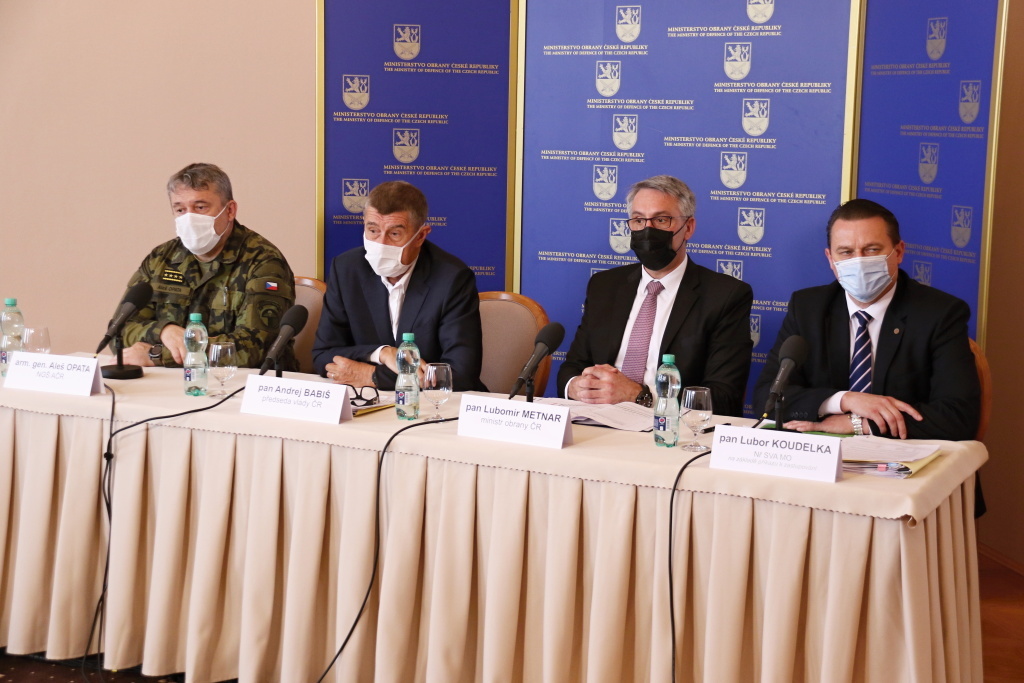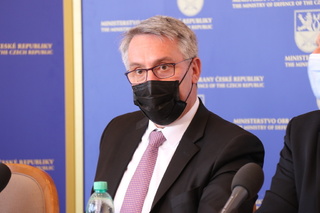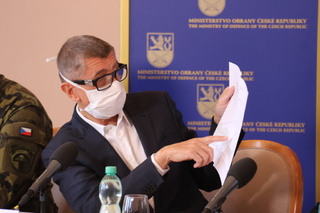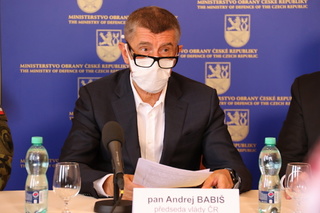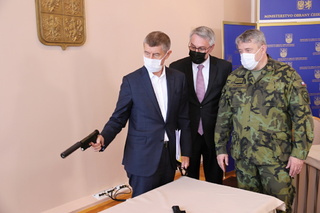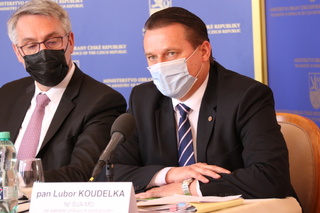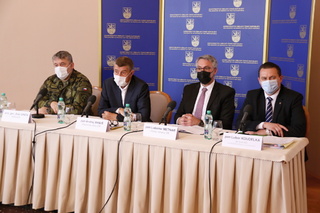Prime Minister Andrej Babiš visited the Ministry of Defence today to support the Armed Forces and express his gratitude to the military for aiding to fight the coronavirus at the same time. The press conference after the meeting voiced another key message: Modernisation must go on. The contract for the new tracked infantry fighting vehicles should be executed by the end of this year.
According to Defence Minister Lubomír Metnar, the Armed Forces has to do away with obsolete Russian equipment as soon as possible. He again cautioned against the repetition of the scenario of the previous crises, when we saw the Czech Armed Forces providing aid wherever needed, yet it was the first to sustain budgetary cuts. “Modernisation must therefore continue. The Armed Forces needs the new tracked infantry fighting vehicles,“ Prime Minister Babiš accentuated.
Other procurements have to run on too, PM Babiš said. One of those examples is also today’s execution of the contract for the procurement of ballistic vests manufactured by the Czech STV Group company.
“Personal protection of our service members is our highest priority. The contract we signed today will cater for the Armed Force’s requirements in this area over the next five years,“ the Defence Minister pointed out.
It is a framework contract that will allow the MoD in 2020-2025 to order up to 46,988 ballistic vests in the maximum volume of CZK 1.67 billion including VAT. The STV Group won the tender launched in May of last year and will deliver the vests in three versions (woodland, desert and black tan for the Military Police) at the highest ballistic protection level IV standards.
Defence budget increasing
Prime Minister Babiš also voiced his support for the defence procurements, as well as the drive for increasing the defence budget despite a major deficit in the state budget caused by the coronavirus pandemic. “We cannot afford putting the modernisation of the military on hold. And we cannot afford not to fulfil our NATO commitments,“ the Prime Minister underscored.
If the economic prognoses prove to be right, the Czech defence spending in 2012 could amount to 1.46 per cent GDP and thus exceed the NATO commitment, which is 1.4 per cent, PM Babiš said. The Government still intends to achieve the two percent GDP share by 2024. For the Armed Forces, that would mean managing a budget of approximately CZK 130 billion. The defence appropriations in the next year are CZK 85 billion; this year the budget amounts to CZK 75.5 billion.
The MoD performs modernisation plans despite the serious setbacks caused by the current crisis and has lately executed framework contracts in total value of five billion CZK. In April of this year, a framework contract was signed with the Česká zbrojovka Uherský Brod (CZUB) for the delivery of 39 thousand small arms valued at CZK 2.8 billion. A contract with the Argun company for the delivery of over 30 thousand helmets valued at CZK 435 million was signed last November.
New IFVs to deliver on the heavy brigade commitment
The number one priority acquisition is the procurement of 210 new tracked infantry fighting vehicles. The MoD plans to sign the contract by the end of this year, while the successful bidder will be asked to agree to spread the payments over six years. According to Minister Metnar, that will alleviate the defence budget and the military will obtain the new equipment, which is so urgently needed.
Investments to create jobs
Minister Metnar also said investments into the Armed Forces will positively reflect in GDP growth, tax collection and employment. “For instance, the procurement of arms from the CZUB for CZK 2.8 billion supports employment and generates return of CZK 900 million in tax payments. The involvement of domestic businesses is key and may yield up to two billion CZK into research and development while creating jobs for as many as 24 thousand citizens,“ Minister Metnar underlined.
In addition to the tracked infantry fighting vehicles, weapons and equipment, the MoD plans to acquire fifty-two NATO standard calibre guns with range twice as long as those presently in the inventory. That is associated with a new fire control system. Next comes the SHORAD program, which involves four air defence missile batteries. With all those programs, the Defence Minister foresees the execution of contracts by the end of this year. The procurement of new small tactical vehicles is also in play. A repeated tender for the acquisition of 1,200 small tactical vehicles is scheduled for the summer.
